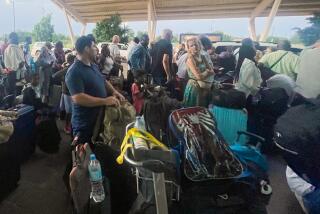NATO Officials See Increasing Chance of U.N. Evacuation
- Share via
BRUSSELS — As conditions in Bosnia-Herzegovina worsened Friday, NATO officials here declared that the likelihood of a limited evacuation of beleaguered U.N. peacekeepers on short notice has increased.
“We’ve always said we want the United Nations to stay, but this is the case now,” a senior North Atlantic Treaty Organization official said.
But the official specifically excluded any immediate attempt by NATO to rescue several hundred Dutch peacekeepers who became trapped earlier this week after Bosnian Serb forces overran the U.N.-declared “safe area” of Srebrenica that they were trying to protect. “I have heard nothing from anyone about Srebrenica,” he said. “For us, that is a ‘mission impossible.’ ”
The official made no reference to the neighboring safe area of Zepa, which came under attack Friday from Bosnian Serb forces.
NATO warplanes buzzed Zepa in support of 79 Ukrainian peacekeepers whose observation posts were targeted with rebel Serb mortar fire. But the aircraft made no attempt to engage the rebels. Under the rules of engagement, the United Nations must first request air support or air strikes before NATO planes can attack. A consistent reluctance by Yasushi Akashi, the U.N. envoy to the Balkans, to approve such attacks has been a major source of tension in relations between the two organizations.
The NATO official expressed exasperation Friday at recent events, noting that the commander of Dutch U.N. forces in Srebrenica had twice requested NATO air support against advancing Bosnian Serb forces more than 24 hours before the town fell but that approval had taken so long that the subsequent attack was futile.
“Their chain of command is taking hours,” the NATO official said. “By the time they ask us for help, it’s always too late and the situation is about to collapse. Our people are very frustrated.”
The official also reaffirmed that, after months of planning, NATO is now ready, if asked, to begin an elaborate operation to extricate some or all of the 23,000 U.N. peacekeepers now serving in Bosnia.
U.S. Army Gen. George Joulwan, supreme commander of NATO forces, reportedly informed Atlantic Alliance ambassadors at a meeting here Wednesday that the rescue force still had “some shortfall” of military engineers and logistics personnel but that these would be filled shortly.
“He said he was ready to react with a quick response to any call for a partial or total withdrawal,” the NATO official said.
As many as 80,000 troops from the 16 NATO member states--including up to 25,000 Americans--could be involved in extricating the U.N. peacekeepers over several months.
While U.N. Secretary General Boutros Boutros-Ghali would have to request such a pullout, NATO would then take command of the operation--one that both military and political leaders in the West desperately want to avoid.
Aside from the enormous risks of extricating the lightly armed U.N. units from a de facto war zone, the spectacle of peacekeepers deployed in the name of the global community fleeing from a ragtag army of rebel Serbs carries all the ingredients of a political nightmare.
In Paris, French President Jacques Chirac added to the United Nations’ humiliation Friday by describing the world body as suffering “congenital impotence.” In a 45-minute news conference, he appealed to Western allies to join with France--which has the largest contingent of U.N. forces on the ground in Bosnia--to defend the Muslim safe area of Gorazde, southeast of Sarajevo.
Chirac compared the situation in Bosnia with the diplomatic capitulation to the bullying of Adolf Hitler during a 1938 summit in Munich, Germany. Through the infamous Anglo-French policy that came to be known as appeasement, Hitler won Czechoslovakia without firing a shot and became emboldened to launch an attack on Poland that triggered World War II.
“I appeal to Western democracies to pull themselves together and impose respect for human rights and international law,” Chirac said.
More to Read
Sign up for Essential California
The most important California stories and recommendations in your inbox every morning.
You may occasionally receive promotional content from the Los Angeles Times.









